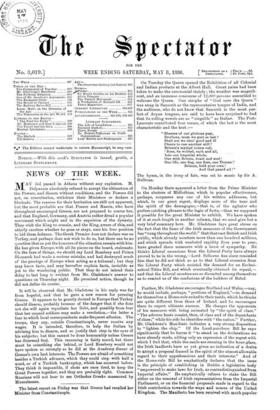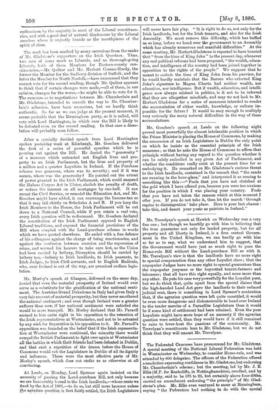Farther, Mr. Gladstone encourages Scotland and Wales,—nay, he would include,
perhaps, "portions of England,"—to demand for themselves a Home-rule suited to their needs, which he thinks are quite different from those of Ireland, and he encourages them to expect ultimate success. He charges the opponents of his measures with being animated by "the spirit of class." "The adverse hosts consist, then, of class and of the dependants of class ;" while his side he identifies with " the nation." Further, Mr. Gladstone's Manifesto indicates a very strong disposition to "lighten the ship." Of the Land-purchase Bill he says significantly that he leaves it "to stand on the declarations we have already made, adding only an expression of the regret with which I find that, while the sands are running in the hour-glass, the Irish landlords have as yet given no indication of a desire to accept a proposal framed in the spirit of the utmost allowable regard to their apprehensions and their interests." And of the Home-rule Bill he emphatically declares that the issue is the principle of establishing in Dublin a legislative body " empowered to make laws for Irish, as contradistinguished from Imperial affairs." He emphatically refuses to stake the Bill either on the removal of Irish representatives from the Imperial Parliament, or on the financial proposals made in regard to the Irish contribution towards the ways and means of the United Kingdom. The Manifesto has beei3 received with much popular
enthusiasm by the majority in most of the Liberal constituen- cies, and with a good deal of natural displeasure by the Liberal seceders whom it unjustly brands as the mouthpieces of the spirit of class.















































 Previous page
Previous page